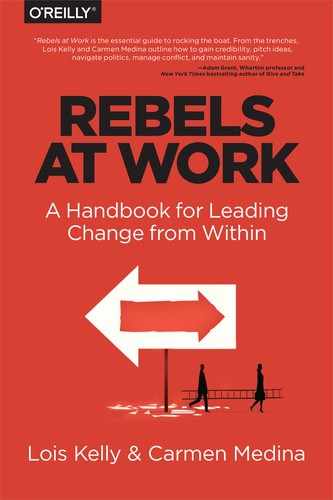Appendix A. How Well Do You Know Your Organization?
Your success as a rebel in part depends on how well you understand your organization, as described in Chapter 4. If you can answer the following questions, you are well on your way to understanding how to position your idea.
Goals and Vision
How can you show that your rebel idea supports the organization’s goals, mission, vision, or values?
- What are the organization’s expressed goals or objectives? What goals are most revered—formally or informally?
- What is the organization’s philosophy, vision, or purpose? What does it stand for and why does it exist?
- What stories have become legends? What makes the story worth retelling? Are there elements that people would love to recapture? Does the story shine a light on what people really value? Can you make your idea part of this story?
- What does the organization value the most, formally and informally? Risk or certainty? Speed or thorough analysis? Challenging assumptions about thinking or upholding standards? Finding new opportunities or focusing on scaling what exists? What is the organization committed to not losing?
Decision Making
What do you need to know about how people make decisions so that you can properly position the idea with people who need to be in the loop?
- Which influential people tend to support what kinds of new programs?
- Who influences whom?
- Who in the organization gets new ideas or projects approved? What helps him get support? Is it the idea? If so, what is appealing about the idea? What is it about his style that helps him move things forward? What could you learn from that?
- How does your boss (or the person you’re seeking approval from) like to make decisions? Lots of data and best practices? Knowing that you’ve socialized the idea with certain key people and received their support? Seeing results from a small-scale experiment? Learning that a competitor is doing something similar? What else?
- How does it feel to be my boss (or any other person you’re trying to influence or gain support from)? Given her perspective, what might appeal to her? What is she likely to say no to? What motivates her to take a risk on something new? What holds her back? What new things like this has she approved in the past?
- What are the business cycles? When are new project funding decisions made? How soon in the cycle do new ideas need to be introduced, and in what way? Are initiatives with different sized budgets assessed differently?
- When you ask people to retell memorable stories about work, what kind of words do people use? How might those words help you understand what is most important to people? And, perhaps, frame your idea in language and a story reflective of those that people feel so fondly about?
Assessing Timing
What signs indicate that the time is right for raising your change idea?
- What emerging trend is creeping into conversations? (Is there a way to link with it?)
- What terms and buzzwords are used in the organization that signal that people are looking for new ideas or considering new ideas?
- What types of new ideas have been approved in the past two years? Is there a way to show how your idea is a natural next step to some of the other recent successes?
..................Content has been hidden....................
You can't read the all page of ebook, please click here login for view all page.
